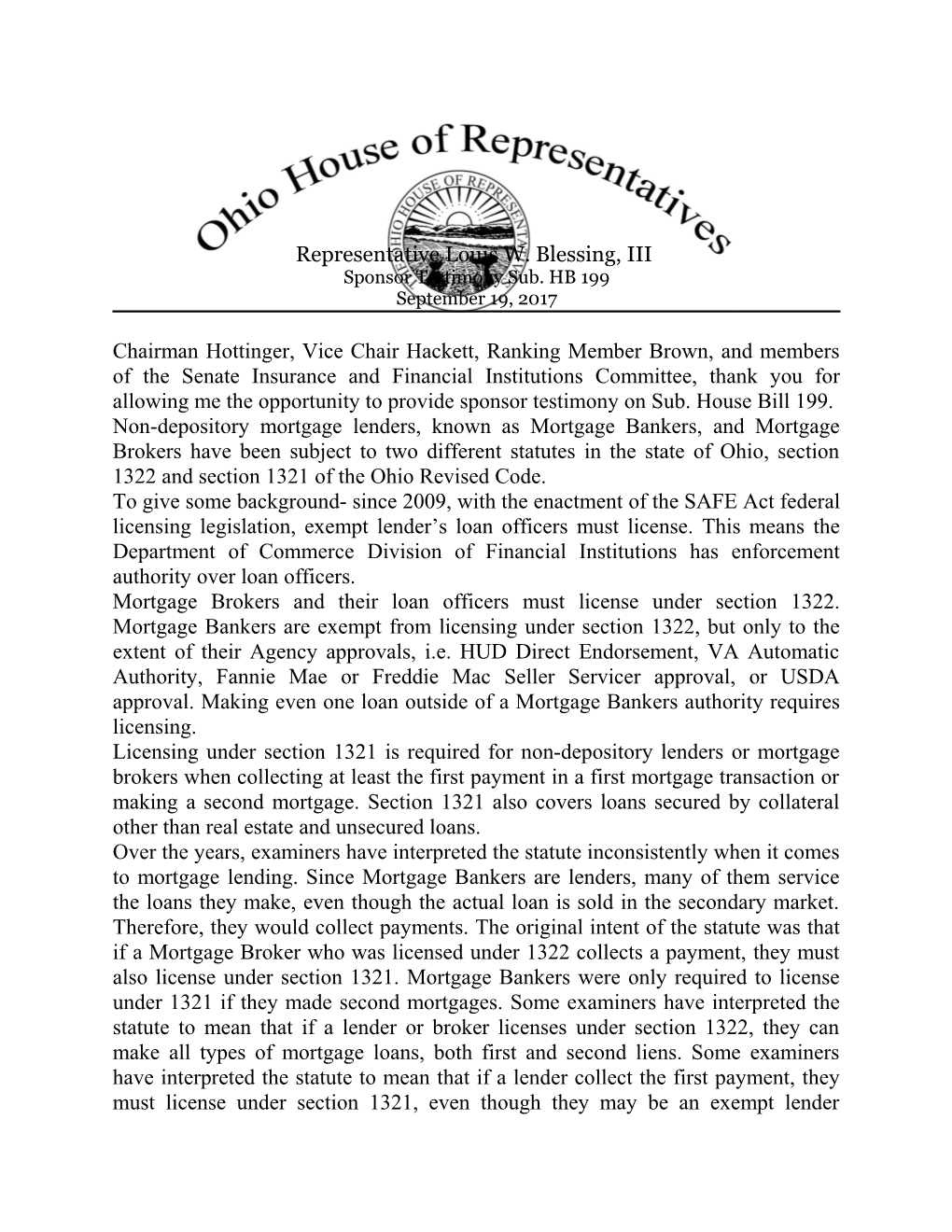Representative Louis W. Blessing, III
Sponsor Testimony Sub. HB 199
September 19, 2017
Chairman Hottinger, Vice Chair Hackett, Ranking Member Brown, and members of the Senate Insurance and Financial Institutions Committee, thank you for allowing me the opportunity to provide sponsor testimony onSub. House Bill 199.
Non-depository mortgage lenders, known as Mortgage Bankers, and Mortgage Brokers have been subject to two different statutes in the state of Ohio, section 1322 and section 1321 of the Ohio Revised Code.
To give some background- since 2009, with the enactment of the SAFE Act federal licensing legislation, exempt lender’s loan officers must license. This means the Department of Commerce Division of Financial Institutions has enforcement authority over loan officers.
Mortgage Brokers and their loan officers must license under section 1322. Mortgage Bankers are exempt from licensing under section 1322, but only to the extent of their Agency approvals, i.e. HUD Direct Endorsement, VA Automatic Authority, Fannie Mae or Freddie Mac Seller Servicer approval, or USDA approval. Making even one loan outside of a Mortgage Bankers authority requires licensing.
Licensing under section 1321 is required for non-depository lenders or mortgage brokers when collecting at least the first payment in a first mortgage transaction or making a second mortgage. Section 1321 also covers loans secured by collateral other than real estate and unsecured loans.
Over the years, examiners have interpreted the statute inconsistently when it comes to mortgage lending. Since Mortgage Bankers are lenders, many of them service the loans they make, even though the actual loan is sold in the secondary market. Therefore, they would collect payments. The original intent of the statute was that if a Mortgage Broker who was licensed under 1322 collects a payment, they must also license under section 1321. Mortgage Bankers were only required to license under 1321 if they made second mortgages. Some examiners have interpreted the statute to mean that if a lender or broker licenses under section 1322, they can make all types of mortgage loans, both first and second liens. Some examiners have interpreted the statute to mean that if a lender collect the first payment, they must license under section 1321, even though they may be an exempt lender seller/servicer. Some lenders and brokers have been told during the examination process that they have the wrong license and may find themselves in a position of unknowingly engaging in unlicensed activity.
Needless to say, the statute is confusing to the mortgage lending industry, examiners, and consumers alike.
Sub. House Bill 199 modernizes, streamlines and clarifies lending regulations; resulting in greater conformity with federal guidelines and eliminating confusion.
Under this legislation, all mortgage loans secured by residential real estate, both first and second liens, would fall under section 1322 of the Ohio Revised Code. Section 1321 would cover loan secured by collateral other than residential real estate and unsecured loans. Both Mortgage Bankers and Mortgage Brokers would license under section 1322, eliminating the Mortgage Banker exemption and giving examination and enforcement authority to the Department of Financial Institutions over all Mortgage Bankers and Mortgage Brokers.
This legislation will be good for the state of Ohio, the mortgage lending industry, and the consumers they serve, because it brings clarity to the statute and applies the same standards to all non-depository lenders when financing a consumer’s most precious asset, their home. I would be happy to answer any questions you may have. Thank you.
